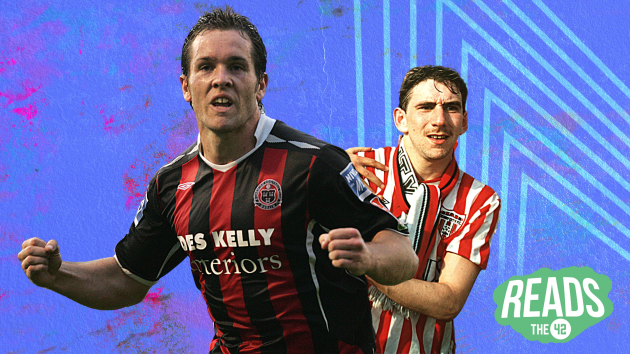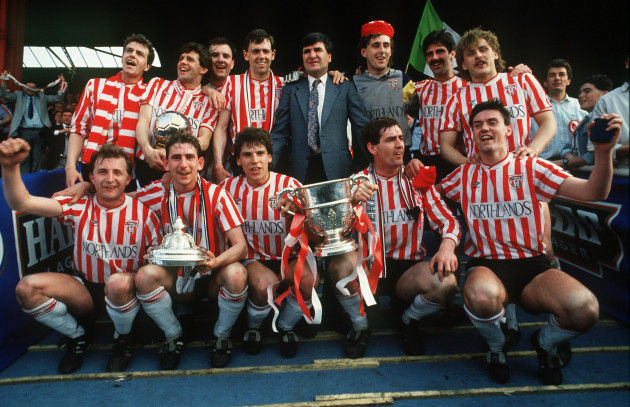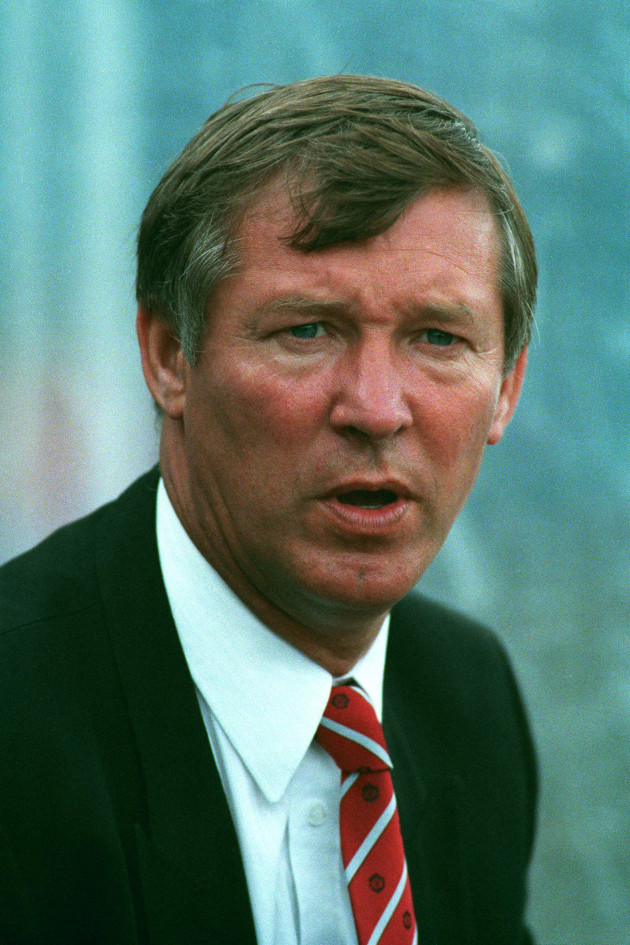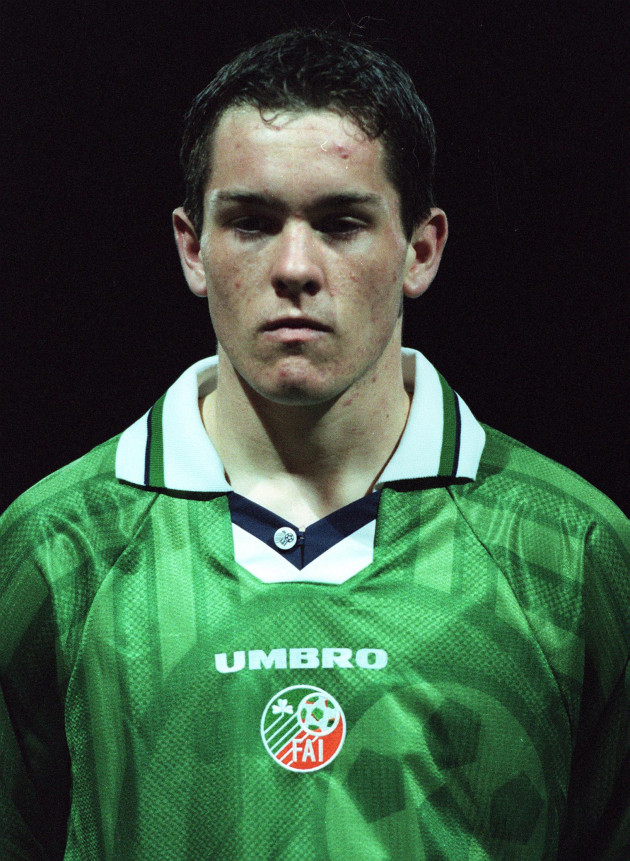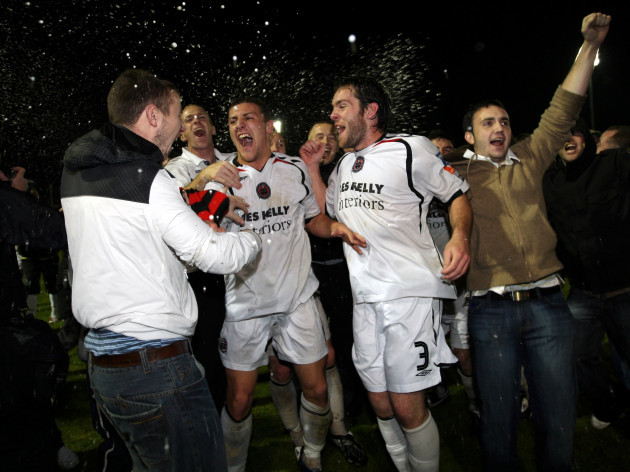IF SHAMROCK Rovers beat Finn Harps on Friday evening, they will claim the title and join a prestigious list of past champions.
Many great sides have graced the Premier Division and if they succeed in winning the league for the second successive time, people may begin to talk about Stephen Bradley’s men in a similar fashion.
A top-flight victory can also present new opportunities for the players in question, with the Hoops last year losing Jack Byrne and Aaron McEneff to clubs abroad after their impressive respective seasons.
With all that in mind, in the article below, we’ve spoken to two previous champions — Paul Carlyle (Derry 1989) and Mark Rossier (Bohemians 2008, 2009; Dundalk 2014) — about what the respective league titles meant for them, both in the moment and for their career generally.
***
The 1988-89 season was just Derry City’s fourth campaign as a League of Ireland club.
Founded in 1928, they had spent the majority of their time playing in the Northern Irish top flight.
In the early 1970s, at the height of the Troubles, the Brandywell was considered an unsafe environment, and so a temporary move was arranged to play their home matches in Coleraine 30 miles away from their traditional base.
When a more suitable long-term solution could not be agreed upon, Derry withdrew from the league and became a junior football team for 13 years before entering the First Division ahead of the 1985-86 campaign, with the Brandywell again allowed to host senior football matches.
The Candystripes earned promotion the following year and swiftly went from strength to strength.
- For more great storytelling and analysis from our award-winning journalists, join the club at The42 Membership today. Click here to find out more >
Jim McLaughlin had helped Shamrock Rovers win three league titles before taking over at Derry in 1986.
He promptly built a formidable squad, recruiting several important players from the Hoops, including Paul Carlyle, for a second stint at Derry, after spending a year at Rovers, who were suddenly falling into disarray on the back of the Milltown debacle.
Success quickly followed for McLaughlin’s team. In 1989, they became the first and still only League of Ireland club to win a domestic treble — a far cry from a few years previously when they had been effectively ostracised from senior football.
For Carlyle, a 21-year-old winger who grew up in Derry, it was the stuff of dreams.
“I think the biggest [memory] was probably when we were coming back home,” he tells The42 when asked about the treble triumph.
“Thousands and thousands of people lining the streets from Strabane right through to the Guildhall would have been the biggest memory.
“You didn’t realise [the scope of it] until you sat and looked back at it.
“There was a BBC programme on it, the crowd was incredible. We had massive support then.”
He continues: “We were quite young and maybe we should have won more with the team we had. It’s just nice to have honours.
“Jim always knew what type of player he wanted. He would maybe check you out beforehand. He knew your background and if you were high maintenance, it was a ‘no no’ for him.
“When I was at Rovers, it was me, Dooler [Paul Doolin], Noel [Larkin] and JC [John Coady]. Noel knew what they were like and then with the Derry lads. They were all top players and they all gelled together. There was very little coaching. It was always five a side, tactical play, but he would have never told you how to play. He would have corrected stuff at half-time maybe.
“You realised: ‘I didn’t know that.’ He always was a step ahead of the game and the players he had. People often say to me about playing with certain people, but it was like telepathy with us. I didn’t have to look to see where Felix [Healy] or Dooler or Liam [Coyle] were — I knew where they would be. And they knew where I would be.
“It was just a general team with very few rows, and if there were, it was nipped in the bud. The players policed the dressing room. Jim would have left the players to sort it out. He had some big figures in there like Mick Neville and Paul Doolin and Felix, and we had the likes of Liam coming in, and you had Johnny Speak who scored goals for fun as well. You had a lot of settled heads with a lot of experience and some had already won quite a few titles.”
Carlyle believes the Derry team of that era deserve to be ranked alongside the likes of the Shamrock Rovers four-in-a-row side and the Dundalk outfit of the late ’70s (which Carlyle’s brother Hilary played on) that did the double among the greatest League of Ireland teams ever.
Yet they ultimately failed to build on their success in later years, narrowly missing out on the title the following season as they finished three points behind St Pat’s and not triumphing again until the 1996-97 season, just after Carlyle had ended his eight-year spell there.
“The next year [after the treble], the league had an emergency meeting. They were thinking: ‘Derry City are too good for the League of Ireland.’ Then we hit a stone wall. We lost the League Cup final on penalties when we should have probably done it again. But that was the players’ fault. We had a few bad injuries and we kind of switched off. So we possibly should have done it the second year as well.
“There was a lot of chopping and changing. The team broke up. Noel [Larkin] went to Australia.
“We should have beaten Athlone down in Athlone. The ‘keeper saved a penalty, they were already relegated and all we had to do was win that to win the league. We could have done the double that year.”
Carlyle’s performances, though, were attracting attention across the water, and with better fortune, he could ultimately have become a Premier League star.
Nothing came from trials at Liverpool and Man United, but it was not due to a lack of ability.
“I went to Liverpool. Everything was sort of agreed. But they thought I had a hernia. They made an appointment for me to go to a specialist. I was on the treatment table and was told my career was over. It was arthritis of the two hip joints. It was a calcium deficiency from birth. But I came back because there were no medicals in the north or south really, I just played on until I couldn’t.
“But it was when Steve Bruce guested for Derry to open the new floodlights, he got back and told [Alex] Ferguson to sign me. Jim called me and said ‘you’re going to United’. I said ‘no I’m not’. I said: ‘What’s the point in me going to United? You know I’ll fail the medical.’ He said: ‘It’s good for the club and good for the city and you’re going.’ So I went to United then.
“Ferguson told me I was good enough to play for Man United. He said I’m going to speak to Jimmy and get you back in a few weeks. I never went back. And I never met him until I played with Portadown and we won the league. We were playing United [in a pre-season friendly] — Cantona, Keane, Scholes and the whole shooting gallery played up at Portadown. I got hurt a week before it. I was coming on as a sub and he spotted me. He remembered me and asked me why I had never come back. I explained it to him and he said ‘you should have told me [about the injury problems]‘. I said: ‘Jim wouldn’t let me tell you.’ He said: ‘I would have done something for you, you should have told me.’ It was nice that he still remembered me and recognised that I should have been over there.
“Especially [the prospect of] playing with Alan Hansen, Barry Venison and Kenny Dalglish [at Liverpool], Gary Gillespie, Jim Beglin was there, Bruce Grobbelaar, Ray Houghton, John Aldridge, you knew if you gave them the ball and you couldn’t do anything with it, you weren’t seeing it again.
“It was one of them ones that I was sick looking at it. It was a good experience [going on trial]. You know your level when you can go over there and play with both of them big clubs. It was an unfortunate thing, but I’ve no regrets.”
Carlyle says the toll from the problems that threatened to end his career prematurely became worse as time wore on.
“I would have driven to Dundalk [later in my career] and I drove home. I used to play on a Thursday night and I couldn’t get out of the car.
“When I warmed up I was okay. Half-time, you cooled down, it took me 10 minutes to get going, but once I was going, I was okay.
“But then, I had a hip replacement at 35 and I need them both done again now — I’m crippled, as us old footballers are all like at the minute.”
Carlyle still meets up with his former Derry teammates from time to time — in fact, he was only chatting to Felix Healy shortly before this interview took place. Going down to the races and having a beer is one popular destination when they meet up, and talk often turns to the fortunes of the current side and how they compare to the legendary ’89 outfit.
“They were all top, top players. A good attitude. We all got on really well. Sometimes you’d find in the changing room that you get wee groups or clans. There was none of that. Jim and the players wouldn’t let it happen. If somebody stepped out of line, everybody wasn’t happy. There was no messing about.”
And despite Rovers’ dominance in the league this season, Carlyle believes Derry’s treble feat is unlikely to be emulated anytime soon.
“Dundalk came close to it under Stephen [Kenny], but I think it might be a while before you see anyone doing it again.”
***
Like Carlyle, Mark Rossiter had serious medical issues as a youngster, to the extent that he retired initially.
The player’s early career was blighted by setbacks. He suffered an anterior cruciate injury playing for Ireland U21s while on the books at Sunderland.
Having made his debut for the Black Cats in a 3-2 League Cup win against Arsenal, he went on to register a couple of first-team appearances for the club, before being released by the side, who were managed by Mick McCarthy at the time, at the end of the 2003-04 season.
“I left England because I had to retire with a medical condition. I had tumours in my knee,” he recalls.
“I was [deemed] medically not fit to play in a professional league.
“So I came home and the only reason I took time out of football was that I had an insurance case going on in the UK. I couldn’t play while that was ongoing.
“My brother was playing with Finn Harps so I went up to training with them. I never signed for Finn Harps, I played one charity game for them. I wasn’t fit to sign for anybody because of my insurance case. Felix Healy was the manager and invited me up to train.
“I had [ultimately] agreed to sign for Sligo Rovers in theory without actually talking about a contract but I’d spoken to Sean Connor. Then he moved and joined Bohs. I gave Sligo two weeks to talk to me and they never did. Sean asked me if I wanted to go up there [to Bohs] and I did.”
On the diagnosis that temporarily halted his career, Rossiter adds: “At 19, you don’t really understand the context — you’re just of the opinion that you’re going to get back playing and that’s it.
“I tore my cruciate three months previous to that diagnosis. The tumour had surfaced in January of that year but it was misdiagnosed as a cyst and it grew four times the size. That was the reason why it ultimately ended up finishing me in the UK.”
Unlike Carlyle, Rossiter says that physically he had “no issues whatsoever” after getting back playing.
Having been accustomed mainly to reserve-team football in England, the League of Ireland felt like a baptism of fire for the defender.
“When I came into the league in 2007, Drogheda won it that year and Drogheda’s squad was ridiculous. We strengthened in the off-season, bringing in the likes of Ken Oman, Killian Brennan and players like that. There were full-time teams, even the part-time teams had excellent players. I’m not saying it’s more professional than now, but more men were playing part-time football [rather than] lads going to college playing part-time football. When you looked at the likes of Longford Town under Stephen Kenny, which was a couple of years previous, they were still unbelievably tough players.
“An awful place to go was Bray, they were a tough old team to come up against. I couldn’t get over how competitive it was at the time. I think it’s a wake-up call for a lot of young players who come back from England as to how tough it is and it’s probably why a lot of them filter out of the league fairly quickly.”
Rossiter, though, managed to forge a career for himself long-term in Ireland. The highlight was five years at Bohs, where he was part of the side that won back-to-back titles in 2008 and 2009.
“You’d be looking at Kevin Hunt, an unbelievable footballer. Owen Heary, [any player's] desire to win at any level in any team that I’ve played in would not match his. He wants to win everything. I’d say if you brought him bowling now, he’d want to win, he’s just a winner. That was unbelievable to see.
“You’re going in there thinking about the Shelbourne team against Deportivo and all this. You’re expecting boys to be arseholes and they weren’t. They were just normal fellas. Crowe-y, who’s a full international, you’re there thinking: ‘Does he have an ego, is he a bit of a dick?’ No. The quietest man in the world. We’d come in for training and I’d probably be the first in and I’d get a cup of coffee.
“Then Crowe-y would come in and he and Fergal Harkin are doing crosswords. It was surreal, the complete opposite of what I would have thought.”
And as was the case with the Derry treble team, it was the players rather than the manager who were primarily expected to control the changing room.
“Pat [Fenlon] came in and Owen would have played under him at Shels and stuff like that, but if you manage them well, they nearly manage your dressing room for you. At a completely different level, Fergie had Roy Keane and Roy Keane ran his dressing room. The likes of Heary, Crowe-y, Jason Byrne came in, he would have been more of a messer, but when he got on the training pitch, they’re different animals altogether. They were class, brilliant to be around.
“When you’re talking about tough games, we had Pat’s in that season, 2008, Heary used to say that the hardest games we played were in training, the matches looked after themselves.”
On the first title triumph, Rossiter adds: “It was the first competitive thing I won that meant something at a men’s level. My favourite memories in football would be my debut for Ireland at U15, the first time I captained Ireland at underage, my debut against Arsenal for Sunderland and winning the league with Bohs. It was probably the best well-oiled machine I’ve been a part of. Everything was top notch.”
And did Rossiter ever doubt he would get to that level, given the numerous early career setbacks?
“I don’t know, I don’t listen to white noise. My body was perfect. In 2008, it was probably the fittest I’ve ever been. Even compared to when I was in England, I was in outrageous shape the pre-season with Bohs that particular year. Pat had us in great shape and it showed that particular season. The number of late goals we got to draw or win games, I think we only lost two games that whole season, it was just a great experience for a player to be a part of.”
Rossiter did win the title once more with Dundalk in 2014 amid the start of the Lilywhites’ era of dominance. However, he admits to being a “bit-part” player by that stage of his career and so it was not quite as special on a personal level.
He adds: “Both teams [Bohs and Dundalk] were the best of their generation, albeit they were several years apart and football evolved a lot within that time. It became a younger man’s league, tactically better. Mentality wise I would have said that Bohs team would have been hard to beat at any level.
“I think I was also the first Sligo man in history to win the Premier and the FAI Cup together, so that was nice on a personal level.”
Rossiter has also, of course, benefitted from working under some highly-rated coaches, including two of the most successful managers in League of Ireland history in Stephen Kenny and Pat Fenlon.
“It’s not that I’d say they’re any better or worse, they all have different strengths. Pat was more intense. With Stephen, there were a couple of lads in the dressing room that loved to be told they were brilliant and Stephen was brilliant at finding what he needed for different players.”
These days, Rossiter works at a recruitment company, which he co-owns, in Dublin Airport. He remains an avid League of Ireland follower though and can be frequently heard commentating on matches for local radio stations Ocean FM and LMFM.
Reflecting on what he has learned from a long career in the game, Rossiter adds: “You only get one shot at it. My advice would be if it doesn’t work out for you at one club, it doesn’t mean you’re a bad player or anything like that. With managers and players, you suit some teams and you don’t others. If you’re going to do it and you want to be successful at it, give your all to it.”
For more great storytelling and analysis from our award-winning journalists, join the club at The42 Membership today. Click here to find out more >

